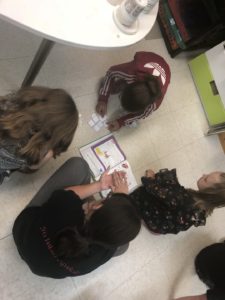Literatura
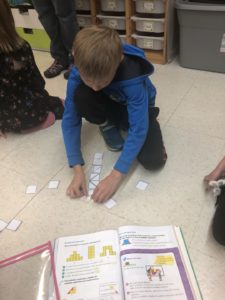 This week we read Un cuento, un cuento. Our objectives were:
This week we read Un cuento, un cuento. Our objectives were:
- understand and identify the setting of a story
- understand and write simple and compound sentences
- to use comprehension strategies such as predicting and summarizing to construct meaning from the text
- to use the comprehension skill sequence as we read the story a second time
Matemáticas
This week we finished our chapter on Two-Dimensional Shapes and began our last math chapter of the year Area and Perimeter. Our objectives were:
- slide, flip, and turn shapes to make congruent figures
- identify congruent figures and symmetric figures
- use folding to find a line of symmetry
- understand the meaning of area
- use square units to find the area of plane figures made of squares and half-squares
- compare the area of plane figures and make plane figures of the same area
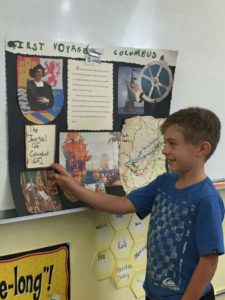 History & Geography
History & Geography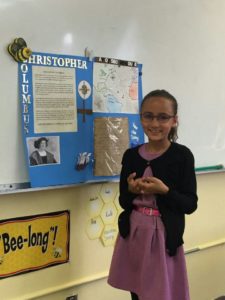
This week in our unit on Colonial America we read about the founding of Maryland and Georgia, religious freedom and the first Thanksgiving, religious dissent and the New England colonies, and the Middle Colonies. We had some interesting discussions about the difference between some of the groups of colonist, such as the pilgrims, puritans, and the Jamestown groups. On Tuesday we had our Explorer Project presentations. Everyone did an outstanding job! The class also enjoyed some snacks representing the countries their explorers originated from. We continue to work on our lap books for this unit.
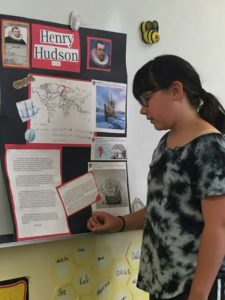 Our objectives were to:
Our objectives were to: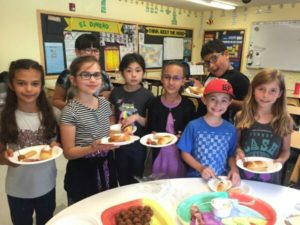
• list and locate the three colonial regions: New England, Middle Atlantic, Southern
• explain some of the early challenges faced by the English in establishing colonies in North America
• describe how everyday life and economic Industries in the three colonial regions were shaped by geography and climate
• describe the relationship between the colonists and Native Americans
• describe the industries and other characteristics of the three colonial regions
•Identify the three cash crops and their importance in southern colonies: tobacco, rice, and indigo
• describe the role of slavery in the colonial time period and why the southern colonies relied so much more heavily upon and slave labor than the middle colonies and the New England colonies
• Identify some of the industries of New England, such as Timber, shipbuilding, and fishing
• locate Plymouth Massachusetts and identify it as a New England colony
• identify 1620 is the year that the pilgrims came to Plymouth on the Mayflower
• identify Rodger Williams the Narragansett, and Anne Hutchinson, as people relative to the settlement of Rhode Island colony
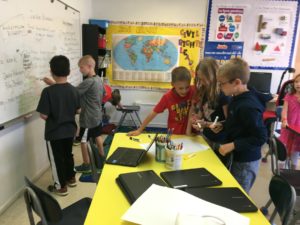 Social Studies with Ms. LauraWe continued our unit on Civil Rights Leaders by learning about Jackie Robinson, Ruby Bridges, Rosa Parks and Dr. Martin Luther King Jr. We read books about Ruby Bridges and Dr. Martin Luther King, Jr. Next week, we will finish up our unit by learning about Cesar Chavez. On Thursday, June 14th, we will review and have our assessment for this unit. Just a final word about this year: I have loved working with these bright and energetic students. Every day was full of questions and answers and enthusiasm. Thank you for sharing them!
Social Studies with Ms. LauraWe continued our unit on Civil Rights Leaders by learning about Jackie Robinson, Ruby Bridges, Rosa Parks and Dr. Martin Luther King Jr. We read books about Ruby Bridges and Dr. Martin Luther King, Jr. Next week, we will finish up our unit by learning about Cesar Chavez. On Thursday, June 14th, we will review and have our assessment for this unit. Just a final word about this year: I have loved working with these bright and energetic students. Every day was full of questions and answers and enthusiasm. Thank you for sharing them!
Science
This week in our ecology domain we learned more about human changes to the environment. Students are continuing to research and work on their ecosystem science project. These will be due on Tuesday June 19th. We will be presenting them in class. Each project should be centered around a chosen ecosystem. Each peoject will have four parts: a food chain, food web, energy pyramid, and a paragraph describing the possible impact of a natural disaster or human changes to their ecosystem.
Our objectives were to:
• explain why nature and ecosystems are not static but are constantly changing
• explain why sometimes animals must leave their habitats when the natural balance is lost
• explain how ecosystems are affected by changes in the environment
• explain how humans affect ecosystems and the environment
• describe and identify human made threats to the environment
• explain why sometimes animals must leave their habitats when the natural balance is lost
English Word Work
The class took our last spelling test this Friday. I encourage all the class to continue to work on the No Excuse Words over the summer so they know how to spell them all by next school year. We worked on a Father’s day surprise and practiced our song for the end of year program. In our journals we used the word of the week “slumber”.

